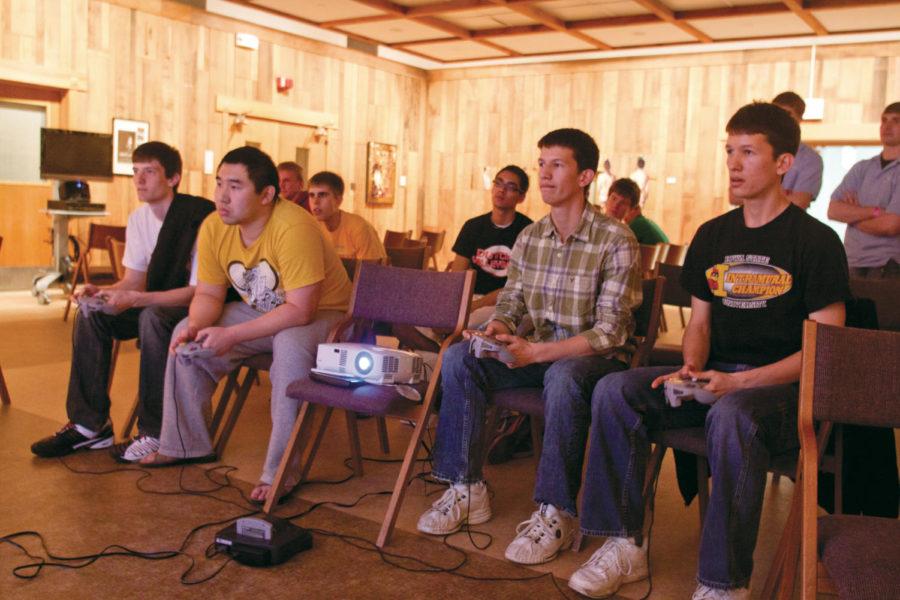Gross: Gaming’s cultural evolution
Photo: John Scallon/Iowa State Daily
Video games have evolved over the years. They used to be commonly associated with nerds and social rejects. Now, however, that stigma has started to fade, especially since games have begun targeting a broader audience, including Nintendo’s Wii attracting the attention of families. .
February 26, 2013
Video games have come a long way from their simple, 8-bit beginnings. For the most part, these changes are wrought by the constant improvements being made to technology. With improved visuals, audio and other technological advances, the gaming experience has gone from stand-up arcade machines like “Pac-Man” and “Space Invader”s to detailed adventures like “Crysis 3” and “Kingdoms of Amalur: Reckoning.”
But gaming has changed in ways other than technological proficiency. When I was growing up on “Spyro the Dragon” and “Mario Kart,” I thought gaming was one of the finer points in life, and I thought everyone else would agree. Time passed and my elementary classmates were quick to show me how wrong I was; gaming was for nerds, dorks and social rejects. That stigma has clung to the gaming industry, though the image of the “typical gamer” has ranged from skinny, bespectacled twerps to obese, greasy neckbeards.
However, in the last five to 10 years, that stigma has begun to fade, if only marginally. In many ways this is because of a rising tide of “nerd culture.” Attachment to retro gaming, old cartoons and comic books is now often seen as endearing rather than dorky. In our modern society, quirkiness is more widely accepted than ever before. Though tried and tested gamers scoff at these “casuals,” there is no denying that they bring a measure of cultural acceptance to the industry.
The gaming industry’s assimilation into common culture is brought about by more than these faux-nerds. Nintendo’s Wii, released in 2006, pulled in an oft-neglected market for the industry: the family. With games that incorporate motion-sensing and party play, the Wii attracted the attention of many parents. Microsoft and Sony have since then ventured similarly into family gaming, with varying success. Regardless of the console on which it is played, this style of gaming raised the industry’s social acceptability even more.
In addition to the family aspect, video games have broadened their horizons in other ways. The vastness of genres available in gaming further expands the market and reduces the social stigma; now, gaming has something for everyone. Horror games, like “Dead Space 3,” are played on the same systems on which you can play the cinematic, Indiana Jones-esque Uncharted games. Maybe you’re looking for an experience in which you solve puzzles, save the world or even raise puppies. Video games cover all of that, and way more.
With video games reaching out to such a broad audience nowadays, it would seem as if the “nerd” label would be completely peeled off. But the dorky stigma of gaming is actually just giving way to a more serious (and some would say ludicrous) stigma: gaming’s connection to violence. Every school shooting or other man-made disaster is accompanied by some general, blanketing blame produced by the media; lately, that blame has been placed squarely on video games.
Undeniably, video games contain violence that occasionally goes beyond imagination. Despite this, conclusive proof that video games inspire acts of violence seems markedly lacking. However, the discussion rages on. Articles such as one clever satirical piece by Wired Magazine (“Blame Game: Video Games, Violence and Consequences”) and an article on The Huffington Post offer perspectives that differ both in opinion and style.
Whether you believe that there is a dangerous connection between video games and violent acts, the industry continues to further integrate itself into society. And despite the apparent violence, many games have surprising benefits.
Though originally thought of as an antisocial behavior, gaming is becoming increasingly social. Massively multiplayer online role-playing games like “World of Warcraft” are a classic example of social gaming. However, these days you would be hard pressed to find a game that can’t somehow connect you with a broader network of players. Sure, it’s not the same as going to parties or spending the day with friends, but gaming is definitely a social activity.
In addition, research has shown that playing video games improves individuals’ decision-making skills and reaction times. It has the ability to sharpen cognitive abilities through the difficult situations and fast-paced action that many games force you into. These recent studies defy the older belief that sitting in front of the television with a controller clutched in your hands dulls mental acuity.
Video gaming has bloomed into a vast, multi-billion dollar industry, though it has faced recent trial through the media’s habit of blaming it for contemporary violence. By reaching cultural acceptance through various methods and shrugging off society’s stigmas, the gaming industry is at least a small part of nearly everyone’s life.
——————————————————————————————-
Hailey Gross is a sophomore in English from Cedar Rapids, Iowa.







